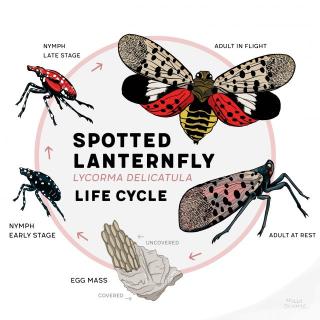Spotted Lanternfly Information
Posted on: August 5, 2022 - 8:54am

The Borough has heard from many residents about the recent large uptick in spotted lanternfly sightings in the area and what they can and should do regarding the invasive pest.
Unfortunately, there is nothing the Borough or state can do for individual households at this time, so residents who have an issue with spotted lanternflies at their house are advised to do the following:
- Put sticky traps or circle traps on fruit and ornamental trees as well as maple, oak, pine, poplar, sycamore, walnut, and willow trees.
- Remove any tree-of-heaven trees from your property (their preferred host plant that attracts)
- Use reduced toxicity sprays and methods such as insecticidal soaps, neem and botanical oils, pyrethrum
- For low numbers of lanternflies, a solution of 1% dish soap and water (i.e. 3 oz. soap in 30 oz. water) can be sprayed onto the plants using a handheld sprayer. There have been some reports that this is also good to destroy egg masses on trees (laid in the fall and stay on tree through winter until they hatch in spring), though it is recommended that found egg masses are scraped off, placed in a Ziploc bag with hand sanitizer, and thrown into the trash. If the lanternflies are on a plant you care highly about, it is highly recommended to not use this mix because it is not known if it will be harmful to the plant, pets, humans, and other animals.
- You can also make a trap by creating a mixture of dish soap and apple cider vinegar inside a jar and leaving the jar outside wherever you see the spotted lanternflies.
- Many people have reported success using white vinegar in a spray bottle as it kills the lanternflies almost instantly. Be advised that this should NOT be used on plants, trees, or shrubs, as it will kill the vegetation as well.
- Hire a professional to do a trunk injection, so if spotted lanternfly try and suck the sap from a tree, it dies.
- If your property is highly infected (more than 500 visible spotted lantern flies), the Rutgers Agricultural Experiment Station recommends contacting a landscape or arborist professionals to do control applications.

